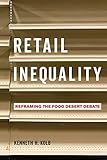Retail inequality : reframing the food desert debate / Kenneth H. Kolb.
Material type: TextPublisher: Oakland, California : University of California Press, [2022]Copyright date: �2022Description: 1 online resourceContent type:
TextPublisher: Oakland, California : University of California Press, [2022]Copyright date: �2022Description: 1 online resourceContent type: - text
- computer
- online resource
- 0520384199
- 9780520384194
- Food security -- Social aspects -- South Carolina -- Greenville
- Grocery trade -- South Carolina -- Greenville
- Food consumption -- South Carolina -- Greenville
- Equality -- Social aspects -- South Carolina -- Greenville
- S�ecurit�e alimentaire -- Aspect social -- Caroline du Sud -- Greenville
- Aliments -- Consommation -- Caroline du Sud -- Greenville
- SOCIAL SCIENCE / Agriculture & Food
- Equality -- Social aspects
- Food consumption
- Grocery trade
- South Carolina -- Greenville
- 338.1/975727 23
- HD9000.5 .K65 2022
Includes bibliographical references and index.
What we got wrong -- A concept catches fire -- Food desert realities : perception, money, and transportation -- Food desert realities : social capital, household dynamics, and taste -- The "Healthy food" frame -- The problem solvers -- A path forward -- Epilogue -- Appendix : food desert media database.
"Retail Inequality examines the failure of recent efforts to improve Americans' diets by improving access to healthy food. Based on exhaustive research in Greenville, SC, Kenneth H. Kolb documents the struggles of two Black neighborhoods. Outsiders ignored their complaints about the unsavory retail options on their side of town until the emergence of the well-intentioned but flawed "food desert" concept. Soon after, new allies arrived to help, believing grocery stores and healthier options were the key to better health. Their efforts, however, did not change locals' food consumption practices. Retail Inequality explains why and outlines the history of deindustrialization, urban public policy, and racism that are the cause of unequal access to food today. Kolb identifies retail inequality as the crucial concept to understanding today's debates over gentrification and community development. As this book makes clear, the battle over food deserts was never about food--it was about equality"-- Provided by publisher.
Description based on online resource; title from digital title page (viewed on November 30, 2021).
Added to collection customer.56279.3
There are no comments on this title.

